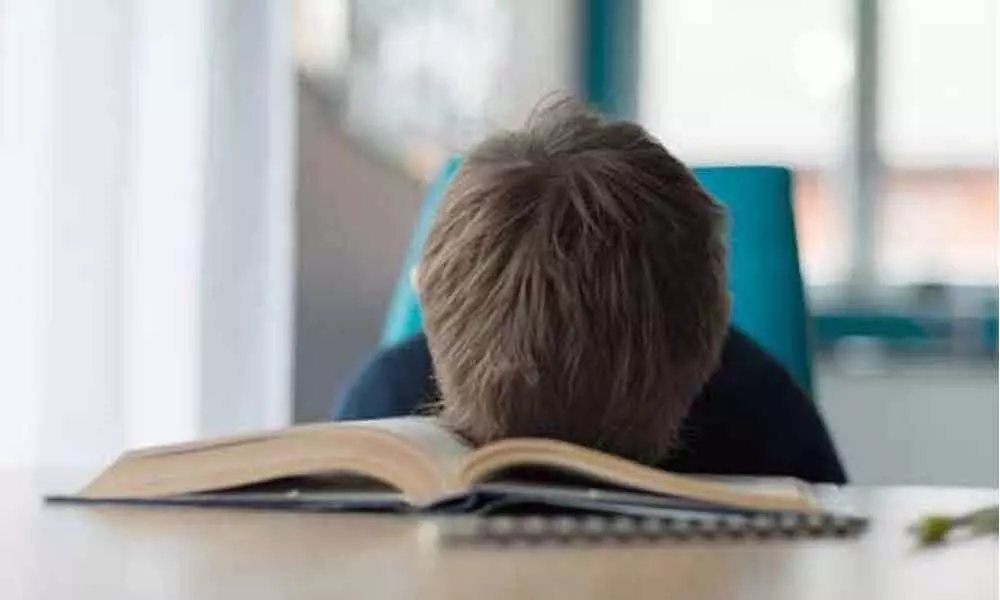Live
- ‘Zebra’ movie review: A gripping tale of banking fraud and redemption
- Saurabh Netravalkar, Unmukt Chand, Dwayne Smith and Rahkeem Cornwall headline USPL
- NPP asks members not to attend meeting called by Biren govt
- Bulls roar on Dalal Street, Sensex and Nifty up over 2 pc
- Over 880,000 people displaced in Lebanon, food security deteriorates: UN
- BGT 2024-25: Bumrah picks 4-17 as Australia trail India by 83 runs in 17-wicket day
- Calcutta High Court stays order on demolition of hotels in Bengal’s Mandarmani
- AP Legislative Council Approves Key Bills
- WhatsApp Update: WhatsApp Rolls Out Group Mentions in Status Updates
- Czech PM, European Council President-elect discuss cooperation, EU priorities
Just In
Visakhapatnam: Slow learners need a different teaching technique altogether


Psychologists suggest that dedicated classes be held for below average students
Visakhapatnam: Do you think a mobile phone with Wi-Fi connection, a quiet corner and a desk are enough for an online class?
While some may think they are enough, it seems to be barely sufficient when it comes to slow learners.
When the management of the educational institutions decided to go virtual most part of this academic year, is access to technology alone suffice for those lagging behind their brilliant peers?
In times of unprecedented Covid-19 crisis, many find e-learning a let-out to keep the academic sessions rolling. But, experts say that the digital platform is going to make it a tad harder for smart students and more so for the below average ones.
Poor connectivity, distractions and time constraints are some of the factors that rob away the concentration level among students in virtual classrooms. However, its impact is intense on slow learners as they need a different teaching technique altogether. "Even in a classroom environment, unless we repeat a lesson for a couple of times, it is difficult for the slow learners to comprehend. During online classes, they find it even tougher to hold their attention for hours as they tend to get distracted fast and also find it hard to grasp the content taught," observes Gullipalli Madhu, Headmaster of Mandal Parishad Primary School, Iruvada, Atchutapuram mandal.
Some teachers have targets to focus on and they indicate that there is a higher possibility of paying minimum individual attention to students in online classes. Having lost a substantial number of working days, many of them have to complete portions and ensure 100 per cent attendance.
Expressing their concerns, below average students say that they are normally reluctant to clarify doubts in the classroom. "What if others find it funny when I raise a question? More often than not, I feel embarrassed to speak before others. But in an online class, I don't have to ask anything and still could get away with it," confesses a Class VIII student.
To overcome challenges experienced by the slow learners in digital classrooms, psychologists suggest that dedicated classes should be held for them.
Experts say that the toughest part in e-learning is to hold students' attention for long. "While most teachers are not tuned to the shift in teaching methods, not many parents could handle the virtual classes effectively at home either. Jotting down points, revising and asking queries would help slow learners to improve in their academics. This apart, parents should monitor them at home and a dedicated class with subject teachers to clarify doubts would go a long way in achieving desirable learning outcomes," explains Pragna Mitra, clinical psychologist, Government Hospital for Mental Care.
Since the basic level of understanding varies from one another, keeping a tab on the subjects taught, ensuring the completion of homework and revising portions at regular intervals would help slow learners absorb the content with apparent ease.

© 2024 Hyderabad Media House Limited/The Hans India. All rights reserved. Powered by hocalwire.com






